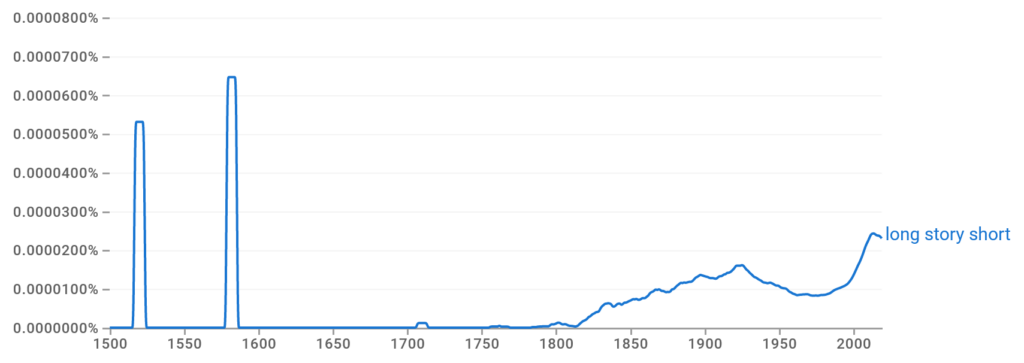Long story short means to leave out unnecessary details and get to the point of a story or explanation. Think of it as the footnotes. It’s an idiomatic expression we commonly use to condense information into its most essential elements.
Idioms, such as long story short, are figurative expressions with meanings beyond their literal interpretation. They convey cultural nuances and add richness to language, aiding effective communication. Understanding idioms enhances language proficiency and cultural literacy.
However, like all idioms, the key lies in how you use it, and that begins with understanding its meaning. Stick with me as I break down its meaning, usage, origins, and related terms to understand why sometimes less is more. I also provide examples to help you put it into practice and include a quick quiz to test your understanding.

What Does the Idiom Long Story Short Mean?
The idiom long story short means summarizing or giving a brief version of a lengthy narrative, skipping unnecessary details, and quickly getting to the main point. According to The Cambridge Dictionary, it’s mostly “used when you do not tell all the details.”
It works great when you want to summarize a lengthy explanation, highlighting only the key points. It can also be used in both formal and informal settings as it essentially calls for a focus on the essence rather than on the details.
Whenever aspiring or first-time authors ask me how to write a back-cover summary or sales blurb for their book, I simply tell them, “It’s just making the long story short.” You have to peel away all the bells and whistles and boil your story down to its protagonist, the main conflict, and the resolution (or a hook if you want to build suspense).
Literal Meaning vs. Figurative Meaning
The literal meaning of long story short implies shortening an actual long story, similar to what I do with my novels. Figuratively, though, it means to summarize complex information or skip less relevant details to convey the main message quickly and efficiently.
Variations of the Idiom
Here are a few variations of the idiom long story short.
- To cut a long story short
- To make a long story short
- To keep it short
- Keeping a long story short
How Is Long Story Short Commonly Used in Context?
Long story short is frequently used in casual and formal communication to streamline information and avoid over-elaboration. Basically, don’t bore people to death with unnecessary details; get to the point!
The following sections explore ways to use the expression, offer tips for effective incorporation into conversation and writing, and provide contextual examples.
What Are the Different Ways to Use Long Story Short?
- In conversations: To quickly convey the main point of a long story. “Anyway, to make a long story short, I bought a new car.”
- Presentations or meetings: To summarize key points without going into extensive details. “Long story short, we’re going to have a slow first quarter, but expect to pick up during the spring.”
- Sarcastically: After you’ve already divulged all the lengthy details, it’s a way to let the other person know you’re done. “Sorry! Long story short, I need to borrow five hundred dollars.”
What Are Some Tips for Using Long Story Short Effectively?
- Use it to transition to the main point of a lengthy discussion and keep the listeners engaged.
- It’s helpful in situations where time is limited or when the audience needs a quick summary.
- Be careful not to oversimplify complex topics to the point of losing essential details. This could come across as disrespectful.
Where Can You Find Examples of Long Story Short?
You can find this idiom used in everyday conversations, professional meetings, literature, and different forms of media. It’s mostly used as a narrative device to skip to the climax or conclusion of a story.
It’s the full title of a 2021 romantic comedy about a man who gets married and wakes up the next day to find that he keeps skipping over long periods of his life.
There was an old podcast I used to listen to called “Long Story Short.” I can’t recall who the host was, but she would break down complex things like books and movies into easily digestible summaries, like cliff notes, but in podcast form.
The idiom is also used as the name of a popular board game where the object is to share stories, experiences, and memories from prompt cards as concisely as possible.
I can’t possibly talk about common uses of this idiom without mentioning the popular Taylor Swift song “Long Story Short” from her 2020 album Evermore. (I’m a Swiftie, so you’re gonna get Swiftie references whenever I can slip them in!)
What Is the Origin of the Idiom Long Story Short?

Long story short likely originated from common conversational practices, evolving from the natural human tendency to simplify and summarize lengthy narratives. Its exact origin is unknown, but it had a lot of usage during the 1500s and really took off as an idiom in the 1800s.
An early version of it in print can be found in a letter written by Henry David Thoreau in 1857, where he said,
“Not that the story need to be long, but it will take a long time to make it short.”
The idea of shortening a long-winded tale goes back thousands of years; the Roman writer Pacuvius wrote in 160 B.C.:
“Ut multa paucis verba unose obnuntiem,”
which roughly means say a lot in a few words.
How Did the Idiom Evolve Over Time?
Over the years, this phrase hasn’t really strayed from its original intent and has become a staple in English language communication, universally understood as a signal for summarization and brevity.
What Are Some Related Terms to Long Story Short?
I like to think of words like those old-fashioned sprinkles. They come in all sorts of colors, but, in the end, they taste the same. That’s how I imagine synonyms! If this idiom doesn’t quite work for the context you’re dealing with, then try some of these alternatives.

Synonyms
- In summary
- In brief
- In a nutshell
- To summarize
- Cut to the chase
- To put it briefly
Antonyms
Or, if you’re looking to express the opposite idea, try on an antonym for size.
- In detail
- Elaborate
- Expand on
Long Story Short: Test Your Knowledge!
Choose the correct answer.
What Have We Learned About Long Story Short?
Long story short is an invaluable tool in the art of communication, teaching us the power of conciseness and the importance of focusing on what truly matters. Whether in storytelling, professional communication, or casual chats, knowing how to distill information to its essence is a skill that enhances clarity and understanding.
Embrace brevity but balance it with the need to convey essential information—that’s the art of making a long story short. I shared details about its meaning and origin and gave you a few alternatives to work with. So, you should be all set! For more quick guides to idiomatic expressions and effective communication techniques, take a look at our other articles!
